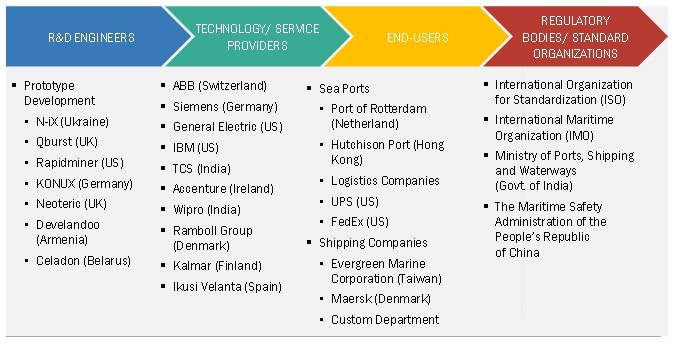The global smart port market is expected to increase significantly, owing to rapid technological advancements and rising demand for effective port operations. According to a MarketsandMarkets analysis, the market is predicted to grow rapidly in the coming years, driven by factors such as automation, digitalization, and IoT integration.
Smart ports use artificial intelligence, blockchain, and big data analytics to improve operational efficiency, maximize resource usage, and streamline supply chain procedures. Smart ports are reinventing the marine industry by focusing on increasing security, decreasing congestion, and limiting environmental impact, while also meeting the changing needs of global trade and logistics.
The global smart port market size will grow to USD 5.7 billion by 2027 from USD 1.9 billion in 2022, at a CAGR of 24.3% during the forecast period.
Download PDF Brochure @ https://www.marketsandmarkets.com/pdfdownloadNew.asp?id=165784113
The smart port market includes prominent Tier I and Tier II manufacturers like IBM, ABB, General Electric, Accenture, and Siemens. These companies have their manufacturing facilities spread across Europe, North America, Asia Pacific, and other regions. Technology like the Internet of Things (IoT) which is involved machine learning, sensor, connectivity, process, and people. The software which has the Internet of Things (IoT) is the amongst the largest share of technology in the smart port industry. This technology is used to increase the efficiency of the smart port and the growth of these industries is expected to also lead to the growth of the smart port market.
Market Map

Key Market Players
ABB (Switzerland), Siemens (Germany), Accenture (Ireland), General Electric (US), Microsoft (US), IBM (US), Port of Rotterdam (Netherlands), Royal Haskoning (Netherlands), Trelleborg (Sweden), TCS (India), Kalmar (Finland), Ramboll Group (Denmark), Navis (US) Wipro (India), and others
Recent Developments
- In June 2022, ABB and Port of Toulon, France secured a contract to connect the largest shore-to-ship project in France. At a crucial juncture in its sustainability effort, the Port of Toulon, which annually serves over 1.6 million ferry and cruise passengers, is committed to ABB shore connection technology. The ABB solution was able to supply three ferries making simultaneous port calls, or one cruise liner, with all their energy requirements. The potential of 50 or 60 Hz power hookups will be available for vessels.
- In April 2022, Accenture acquired the Argentina-based integrated data and AI consulting service Ergo. It helped the development of a culture of data-driven decision-making with analytics, artificial intelligence (AI), and big data. In the Hispanic South American market, which includes Argentina, Chile, and Colombia, the acquisition broadens Accenture’s Cloud First capabilities to enable data-led transformations for clients.
- In March 2021, Siemens has been awarded a contract from the Port of Kiel to implement a cloud-based power monitoring solution for its shore power system. The shore power system will cover the electricity demand of all the ships with green power while they are berthed at the Port of Kiel.
- In January 2019, IBM was awarded a contract by the Spanish Port Authority to use a blockchain-based shipping platform (Tradelens) to improve operational efficiency. IBM’s Tradelens generates incremental value for freight forwarders, shipping firms, shippers, and logistics service providers.
Request Sample Pages – https://www.marketsandmarkets.com/requestsampleNew.asp?id=165784113
The Asia Pacific region has an increasing number of ports each year, and those that already exist are expanding. This is because the majority of cargo transit occurs via maritime routes. The program aims to boost the effectiveness of the regions current port facilities through automation, information technology, streamlining of work procedures, the use of new equipment, and employee training. It will help to grow in the smart port industry and drive forward.
Asia Pacific is one of the fastest-growing regions in the world due to numerous factors such as international manufacturing hub, global supply chains, low production costs, and each country’s export-led development policies. This has translated into the increasing volume of cargo moving from this region. Major cargo transportation happens through sea routes, owing to which the number of ports in Asia Pacific is increasing every year, and the existing ports are witnessing expansion. Automation, streamlined work processes, implementation of new equipment, and staff training are all a part of the plan to increase the efficiency of existing port facilities in the region.


